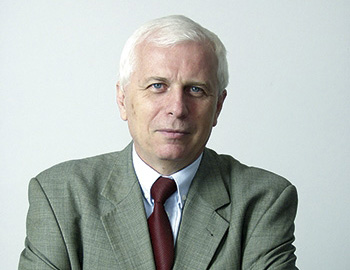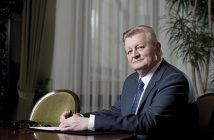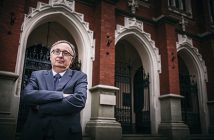A conversation with Prof. Karol Musioł, Rector of the Jagiellonian University in Kraków.
• Professor, it was your ambition to create the largest biotechnological centre in Central and Eastern Europe at the University. At what stage is this project at the end of your second term of office?
• I am leaving this investment at an advanced stage of development to my successor. We have raised funds for Małopolska Biotechnology Centre, which we create together with the University of Agriculture, and which will be used for the research purposes. We already have the Jagiellonian Centre of Innovation – Life Science Park. The first building already stands there and two more buildings will be ready in 2013. A huge incubation centre for all biotechnological ideas will find its place there, also in the field of biomedicine and biochemistry. Prof. Stefan Chłopicki, a pharmacist from the Jagiellonian University Medical College, who is the leader of a grant worth over 110 million PLN, which is intended for buying equipment and carrying out research, is one of the customers of the centre. The process of building scientific research infrastructure will take 5-6 more years, but we have had a really great start. Especially, that the National Synchrotron Radiation Centre is under construction on our newest campus. It will provide research tools for, among others, biotechnologists, biophysicists, and biochemists.
• Are global companies interested in the infrastructure created at Life Science Park?
• Many companies of international renown have already rented space for their research laboratories there. The mechanism is similar to that which worked in the case of IT or outsourcing companies, which created their centres in Kraków and employed thousands of people in them. Not because Kraków boasts Wawel Castle and the Cloth Hall, but because many very well-educated young people live here. The entire investment programme is buttoned up, and my successor will probably focus on making the best use of what is being built now. After all, the construction of the 600th Anniversary of the Restoration of the Jagiellonian University Campus, where all departments of natural sciences will be transferred soon, is coming to an end. Its construction will cost a total of about one billion PLN.
• What apart from life science is a priority at the Jagiellonian University?
• We are widely recognized for high standards of the humanities at our University. If we focus on the new campus, it is also because the humanities departments will have very modern conditions for education and doing research there. Philologists will get a modern building, which will meet global standards. Other humanities departments will move to the renovated buildings in the city, from which the departments of natural sciences and science moved out. Collegium Medicum (Medical College), which offers a very high level of professional training and studying for foreigners, is another pillar of the development of the University. Preparations to build a new clinical hospital are underway, and in a few years1 time it will be the most modern hospital in southern Poland.
• But, the Jagiellonian University is now ranked only in the fourth hundred in the world university rankings.
• So far, the reason has been that we ‘had no cannons’, as it says in the popular anecdote about Napoleon. Now, they are being cast. To exist in science, we are building not only the buildings, but we fill them with ultra-modern apparatus. We assume that when good people get better conditions, they work more efficiently. And there are lots of ambitious and exceptionally talented people at our University.
• How do your colleagues from universities across the world react to the changes the Jagiellonian is undergoing?
• They note that science in Kraków is at a high, international level. Many consider us an emerging, scientific economy. Until recently, many scientists from Kraków practised a kind of outgoing scientific research, as they travelled all over the world seeking better conditions for carrying out their research. Intellectually, however, we can stand any competition. Now, they more and more often return to Kraków, because finally, they find decent, meeting the requirements of the twenty first century working conditions.
• Professor, it was your ambition to create the largest biotechnological centre in Central and Eastern Europe at the University. At what stage is this project at the end of your second term of office?
• I am leaving this investment at an advanced stage of development to my successor. We have raised funds for Małopolska Biotechnology Centre, which we create together with the University of Agriculture, and which will be used for the research purposes. We already have the Jagiellonian Centre of Innovation – Life Science Park. The first building already stands there and two more buildings will be ready in 2013. A huge incubation centre for all biotechnological ideas will find its place there, also in the field of biomedicine and biochemistry. Prof. Stefan Chłopicki, a pharmacist from the Jagiellonian University Medical College, who is the leader of a grant worth over 110 million PLN, which is intended for buying equipment and carrying out research, is one of the customers of the centre. The process of building scientific research infrastructure will take 5-6 more years, but we have had a really great start. Especially, that the National Synchrotron Radiation Centre is under construction on our newest campus. It will provide research tools for, among others, biotechnologists, biophysicists, and biochemists.
• Are global companies interested in the infrastructure created at Life Science Park?
• Many companies of international renown have already rented space for their research laboratories there. The mechanism is similar to that which worked in the case of IT or outsourcing companies, which created their centres in Kraków and employed thousands of people in them. Not because Kraków boasts Wawel Castle and the Cloth Hall, but because many very well-educated young people live here. The entire investment programme is buttoned up, and my successor will probably focus on making the best use of what is being built now. After all, the construction of the 600th Anniversary of the Restoration of the Jagiellonian University Campus, where all departments of natural sciences will be transferred soon, is coming to an end. Its construction will cost a total of about one billion PLN.
• What apart from life science is a priority at the Jagiellonian University?
• We are widely recognized for high standards of the humanities at our University. If we focus on the new campus, it is also because the humanities departments will have very modern conditions for education and doing research there. Philologists will get a modern building, which will meet global standards. Other humanities departments will move to the renovated buildings in the city, from which the departments of natural sciences and science moved out. Collegium Medicum (Medical College), which offers a very high level of professional training and studying for foreigners, is another pillar of the development of the University. Preparations to build a new clinical hospital are underway, and in a few years1 time it will be the most modern hospital in southern Poland.
• But, the Jagiellonian University is now ranked only in the fourth hundred in the world university rankings.
• So far, the reason has been that we ‘had no cannons’, as it says in the popular anecdote about Napoleon. Now, they are being cast. To exist in science, we are building not only the buildings, but we fill them with ultra-modern apparatus. We assume that when good people get better conditions, they work more efficiently. And there are lots of ambitious and exceptionally talented people at our University.
• How do your colleagues from universities across the world react to the changes the Jagiellonian is undergoing?
• They note that science in Kraków is at a high, international level. Many consider us an emerging, scientific economy. Until recently, many scientists from Kraków practised a kind of outgoing scientific research, as they travelled all over the world seeking better conditions for carrying out their research. Intellectually, however, we can stand any competition. Now, they more and more often return to Kraków, because finally, they find decent, meeting the requirements of the twenty first century working conditions.








